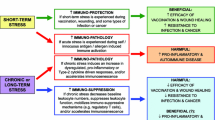Abstract
Although irritable bowel syndrome (IBS) can be considered a biopsychological disorder in which an association between life stress and physiological changes leading to bowel irregularity is present, there is a lack of data concerning possible modifications of the adrenal function during the disease. The aim of the present study was to measure biological and psychological variables related to the activity of the hypothalamo-pituitary- adrenal axis in IBS patients compared to healthy subjects. Cortisol was measured in the saliva (obtained by a stress-free, non invasive collection procedure) of 55 IBS outpatients and 28 matched controls. Moreover, each subject completed the following self-administered questionnaires: the Rome Burnout Inventory (RBI) in its physical (RBI-PE) and emotional-mental exhaustion (RBI-EME) components, Beck Depression Inventory, State and Trait Anxiety Inventory (STAI), Perceived Social Support Scale (PSSS) and a Scale for the Assessment of Perceived Actual Work-Non Work Stress. Compared with controls, IBS subjects showed significantly higher levels of cortisol in the morning and lower in the evening, while they maintained the physiological circadian fluctuation (i.e. cortisol morning level higher than in the evening). Moreover, IBS patients presented a significant difference from controls in RBI-PE scores, which confirms the presence of fatigue, a symptom frequently reported by the patients. Compared with controls, no differences were found in IBS patients with respect to other psychological parameters. These findings suggest a dysregulation of the adrenal activity in IBS patients. The results may be relevant considering that changes in cortisol levels have been shown to be sensitive indicators of psychosocial stress and coping patterns in both laboratory and life situations.
Similar content being viewed by others
References
Lynn R.B., Friedman L.S. Irritable bowel syndrome. N. Engl. J. Med. 1993, 329: 1940–1945.
Talley N.J., Gabriel S.E., Harmsen W.S., Zinsmeister A.R., Evans R.W. Medical costs in community subjects with irritable bowel syndrome. Gastroenterology 1995, 109: 1736–1741.
Hahn B.A., Yan S., Strassels S. Impact of irritable bowel syndrome on quality of life and resource in the United States and United Kingdom. Digestion 1999, 60: 77–81.
Kennedy H.G. Fatigue and fatigability. Br. J. Psychiatry 1988, 153: 1–5.
Farthing M.J.G. Irritable bowel syndrome, irritable body, or irritable brain? BMJ 1995, 310: 171–175.
Mason J.W. A review of the psychoendocrine research on the pituitary-adrenal cortisol system. Psychosom. Med. 1968, 30: 576–607.
Rose R.M. Overview of endocrinology of stress. In: Brown G.M., Koslow S.H., Reichlin S. (Eds.), Neuroendocrinology and psychiatric disorders. Raven Press, New York, 1984, p. 95.
Kirschbaum C., Hellhammer D.H. Salivary cortisol in psychoneuroendocrine research: recent developments and applications. Psychoneuroendocrinology 1994, 19: 313–333.
Pines A., Aronson E. Burnout: from taedium to personal growth. Free Press, New York, 1981.
Dell’Erba G., Venturi P., Rizzo F., Porcù S., Pancheri P. Burnout and health status in Italian air traffic controllers. Aviat. Space Environ. Med. 1994, 65: 315–322.
Venturi P., Dell’Erba G., Rizzo F. Disagio mentale, uso di psicofarmaci e malattie psicosomatiche in due popolazioni a rischio per la sindrome del burnout. Minerva Psichiatr. 1994, 35: 155–167.
Talley N.J., Phillips S.F., Melton L.J., Mulvihill C., Wiltgen C., Zinsmeisteir A.R. Diagnostic value of the Manning criteria in irritable bowel syndrome. Gut 1990, 31: 77–78.
Beck A.T., Ward C.H., Mendelson M., Mock J., Erbaugh J. An inventory for measuring depression. Arch. Gent. Psychiatry 1961, 4: 561–571.
Spielberger C.D. Test manual for the State-Trait Anxiety Inventory-Stai form y. Consulting Psychologist Press, Palo Alto, 1980.
Blumenthal J.A., Burg M.M., Barefoot J., Williams R., Haney T., Zimet G. Social support, Type A and coronary artery disease. Psychosom. Med. 1987, 49: 331–340.
Winer BJ. Statistical principles in experimental design, 2 ed. McGraw-Hill, Tokio, 1971.
Heim C., Ehlert U., Hellhammer D.H. The potential role of hypocortisolism in the pathophysiology of stress-related bodily disorders. Psychoneuroendocrinology 2000, 25: 1–35.
Dell’Erba G., Pancheri P., Intreccialagli B. Hormonal assessment and workload correlates in air traffic controllers at the end of night shift: the stress perspective. New Trends Experi. Psyc. 1988, 4: 197–212.
West K.L. MMPI correlates of ulcerative colitis. J. Clin. Psychol. 1970, 26: 214–229.
Whitehead W.E., Bosmajian L., Zonderman H.B., Costa P.T. Jr, Schuster M.M. Symptoms of psychological distress associated with the irritable bowel syndrome: Comparison of community and medical clinic samples. Gastroenterology 1988, 95: 709–714.
Blanchard E.B., Scharff L., Schwarz S.P., Suls J.M., Barlow D.H. The role of anxiety and depression in irritable bowel syndrome. Behav. Res. Ther. 1990, 28: 401–405.
Kumar D., Wingate D.L. The irritable bowel syndrome: A paroxysmal motor disorder. Lancet 1985, ii: 973–977.
Heaton K.W., O’Donnell L.J., Braddon F.E.M., Mountford R.A., Hughes A.O., Cripps P.J. Symptoms of irritable bowel syndrome in a British urban community: consulters and nonconsulters. Gastroenterology 1992, 102: 1962–1967.
Sensky T., MacLeod A.K., Rigby M.F. Causal attributions about common somatic sensations among frequent general practice attenders. Psychol. Med. 1996, 26: 641–646.
Author information
Authors and Affiliations
Corresponding author
Rights and permissions
About this article
Cite this article
Patacchioli, F.R., Angelucci, L., Dell’Erba, G. et al. Actual stress, psychopathology and salivary cortisol levels in the irritable bowel syndrome (IBS). J Endocrinol Invest 24, 173–177 (2001). https://doi.org/10.1007/BF03343838
Accepted:
Published:
Issue Date:
DOI: https://doi.org/10.1007/BF03343838




